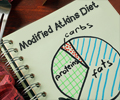Basic Principle of Atkins Diet
The core concept of ‘The Atkins Diet’ is Dr. Atkins' theory that over-consumption of and hypersensitivity to carbohydrates is the root of problem of being overweight. The principle he bases his plan on says that it is the way the body processes the carbohydrates we eat - not how much fat we eat - that causes weight gain.

Atkins says that many overweight people may be ‘insulin resistant’, that is, the cells that convert carbohydrates into glucose (which becomes energy) do not work correctly.
That's where Dr. Atkins' plan comes in. Restrict the carbohydrate intake, especially the ‘bad’ ones like those found in processed, pre-packaged and junk foods (cookies, sodas, etc.); and follow a high-protein diet plan.
By reducing the carbohydrate intake to less than 40 grams a day, the body enters a process called ketosis. Ketosis is a state during which the body must rely on stored fat for energy. As a result, the body begins to burn fat quickly and weight loss is achieved. This process also makes the body produce compounds called ketones, which initially give dieters a 'buzz' or euphoric feeling.
According to Dr. Atkins, ketosis affects insulin production and prevents more fat from being formed. Atkins' plan suggests that once the body enters ketosis and begins efficiently using the fat as fuel, a dieters’ craving for carbs will subside. Most dieters do not feel deprived on low-carbohydrates diets for the first several days because they are eating meals high in fat.
At later stages, the carbohydrates are gradually re-introduced in the diet until the desired weight loss is achieved.










